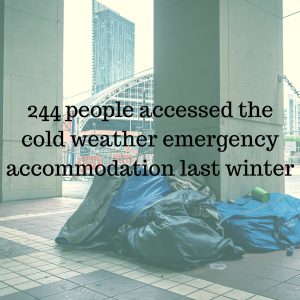During periods of severe cold weather, additional emergency accommodation is provided by the council (often referred to as SWEP).
This is a brief guide to what SWEP is and how it can be accessed. We hope this will clear up some confusion for those of us who are concerned about people who are sleeping rough, especially over winter.
The basics
Severe weather emergency provision kicks in when the weather is forecast to be sub zero for 3 consecutive days. At this point the usual guidelines over who the council has a duty to provide emergency accommodations for are lifted, and extra provision is made for rough sleepers, regardless of their status.
The council work in partnership with a number of organisations and housing providers to make this additional accommodation available, covering the accommodation and staff costs.
Referrals into this accommodation can be made via the council rough sleeper team on 0161 234 5339 or roughsleepersteam@manchester.gov.uk, via the Booth Centre , YPSF, or Riverside‘s outreach service. When daytime services are closed you can refer through the MCC out of hours number on 0161 234 5001, or through Coffee4Craig.
There are outreach workers covering different areas in the city to connect with people who are rough sleeping and helping them to get inside if they want to.Each individual is assessed so that appropriate accommodation can be found based on their needs.
There could be cases where accommodation providers may feel that they are not able to accommodate someone for example through violent behaviour, but the underlying principles of SWEP mean that every effort is made to find somewhere suitable.
 Why is SWEP needed?
Why is SWEP needed?
The number of people finding themselves homeless is rising whilst public service budgets are being cut. There simply is not enough accommodation.
From cuts to supported housing schemes to a shortage of affordable and social housing in Manchester, resources are stretched. The Council has provided additional beds for rough sleepers that are available throughout the winter, but as numbers are so high there is a waiting list.
Those able to access emergency accommodation are prioritised on a range of criteria including whether they are priority need, being eligible for assistance, having a local connection, and not being considered intentionally homeless.
There are some beds provided by the voluntary sector for people who are not priority need, but they are generally full. This currently includes the Church night shelters, Cornerstones pods and Boaz Trust shelter for destitute asylum seekers.
When severe weather hits extra provision is made available – somewhere warm to sleep is made a priority. Not everyone chooses to access this provision, but the option to go inside is made available for those that are willing and able to accept it.
Local plans
Although these are national guidelines on minimum standards, councils are able to design their own offer. An example of this is in Liverpool where they have chosen to provide SWEP whenever the temperature is under 2 degrees.
In a recent discussion at the Booth Centre with people with lived experience, we heard how it feels sleeping outside is not only a case of temperature – wet and windy conditions aswell as snow can make it feel much colder than it is.
Local plans for SWEP are developed as a partnership between the Council, commissioned providers, and the voluntary sector. Activating SWEP currently involves 11 different accommodation schemes and 4 providers, as well as two emergency shelters and an assessment centre catering for up to 67 people each night.
For many people, the 3 consecutive nights rule is hard to understand, as a single night in these conditions can feel unbearable. Providing this extra provision is challenging and requires advance planning. Many staff and volunteers make commitments in addition to the work they already do, so this is also a consideration.
Partnership meetings are held just before winter to plan the provision each year. At the end of the winter there is a review meeting to look at who used the SWEP provision, what went well and what could be improved. One improvement that came from last year is to have an indoor assessment point which will be run by Coffee4Craig.
What next?
Through the charter action groups we have discussed issues and suggestions with people who are homeless around emergency accommodation, supported housing, substandard private B&Bs, lack of move on accommodation, housing first schemes and other issues related to accommodation. There are some fantastic ideas for solving these issues, and the provision of accommodation is reviewed regularly, increasingly involving people with lived experience.
We hope that one day there will be enough accommodation and support in the city so that SWEP is no longer needed.
#EndHomelessnessMCR